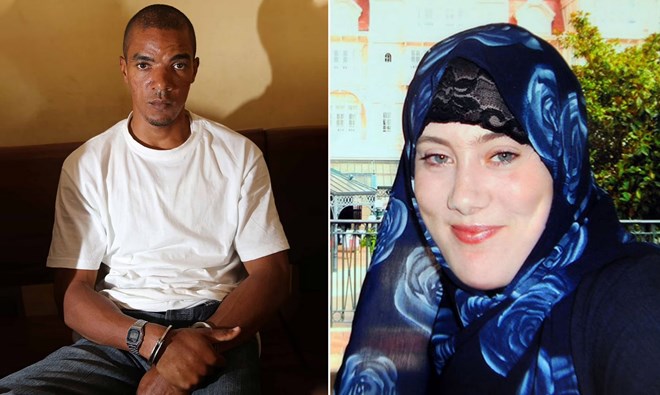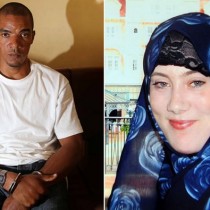
Terror suspect accused of plotting to blow up hotels in Kenya with links to 'White Widow' terrorist could be sent back to the UK within days
,,
Jermaine Grant, 40, faces removal from Kenya after serving nine years in jail for possessing bomb-making materials and forging immigration papers.
Grant was prosecuted in Kenya after police found chemicals, switches and a bomb-making manual in a flat he shared with Lewthwaite, whose husband Germaine Lindsay was one of the four suicide bombers who killed 52 people in London in 2005.
When police swooped on the flat in 2012, Lewthwaite had fled, escaping just minutes earlier after Grant allegedly warned her with a text message, saying: ‘The lions are inside. One of them is very watchful, like a bird watches a stone.’ She is still at large.
Grant, who was born in Newham, east London, was accused of plotting to unleash terror by bombing hotels frequented by tourists in Mombasa. Prosecutors also claimed he had ties to the Islamist terror group al Shabaab, al-Qaeda’s affiliate in Somalia. He was charged with possession of bomb-making materials, preparing to commit a felony and forging immigration documents.
A team of counter-terrorism officers from Scotland Yard flew to Kenya to assist in his prosecution. Met Detective Inspector John Reilly told Grant’s trial in 2014: ‘We know that the chemicals found at Grant’s house were designed to make a bomb. We believe the gang was at the end of its preparations.’
Grant was convicted of possession of bomb-making materials, but was acquitted in 2019 of ‘conspiracy to commit a felony’ in relation to the terror plot. Now he faces a court in Kenya on Wednesday to decide whether he should be deported.
Prosecutor Bernard Ngiri has filed an application to kick him out of the country as an ‘unwanted immigrant’ after he was released from prison on June 24.
If the High Court judge agrees to his deportation, he is likely to be removed immediately.
The development raises questions about whether he will face any monitoring in Britain, where Grant has not been charged with any terror offence.
One option could be a terrorism prevention and investigation measure (TPIM), which allows the authorities to monitor people considered to be terrorists, but who are not facing criminal charges. Suspects face measures such as wearing an electronic tag, a ban on internet use, and limits on who they can meet and where they can go.
A Home Office spokesman said: ‘We do not routinely comment on individual cases.’

By REBECCA CAMBER CRIME AND SECURITY EDITOR

A terror suspect accused of plotting to blow up hotels in Kenya with ‘White Widow’ Samantha Lewthwaite is set to be deported back to Britain within days.
Jermaine Grant, 40, faces removal from Kenya after serving nine years in jail for possessing bomb-making materials and forging immigration papers.
It raises the alarming prospect that a terror suspect who was a close associate of the world’s most wanted woman will be released back on the streets of Britain within days.
Grant was prosecuted in Kenya after police found chemicals, switches and a bomb-making manual in a flat he shared with Lewthwaite, whose husband Germaine Lindsay was one of the four suicide bombers who killed 52 people in London in 2005.
When police swooped on the flat in 2012, Lewthwaite had fled, escaping just minutes earlier after Grant allegedly warned her with a text message, saying: ‘The lions are inside. One of them is very watchful, like a bird watches a stone.’ She is still at large.
Grant, who was born in Newham, east London, was accused of plotting to unleash terror by bombing hotels frequented by tourists in Mombasa. Prosecutors also claimed he had ties to the Islamist terror group al Shabaab, al-Qaeda’s affiliate in Somalia. He was charged with possession of bomb-making materials, preparing to commit a felony and forging immigration documents.
A team of counter-terrorism officers from Scotland Yard flew to Kenya to assist in his prosecution. Met Detective Inspector John Reilly told Grant’s trial in 2014: ‘We know that the chemicals found at Grant’s house were designed to make a bomb. We believe the gang was at the end of its preparations.’
Grant was convicted of possession of bomb-making materials, but was acquitted in 2019 of ‘conspiracy to commit a felony’ in relation to the terror plot. Now he faces a court in Kenya on Wednesday to decide whether he should be deported.
Prosecutor Bernard Ngiri has filed an application to kick him out of the country as an ‘unwanted immigrant’ after he was released from prison on June 24.
If the High Court judge agrees to his deportation, he is likely to be removed immediately.
The development raises questions about whether he will face any monitoring in Britain, where Grant has not been charged with any terror offence.
One option could be a terrorism prevention and investigation measure (TPIM), which allows the authorities to monitor people considered to be terrorists, but who are not facing criminal charges. Suspects face measures such as wearing an electronic tag, a ban on internet use, and limits on who they can meet and where they can go.
A Home Office spokesman said: ‘We do not routinely comment on individual cases.’
SORCE:-




 0
0 







Terror suspect accused of plotting to blow up hotels in Kenya with links to 'White Widow' terrorist could be sent back to the UK within days
,,